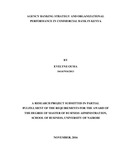| dc.description.abstract | Overcoming challenges in strategy implementation necessitates the successful adoption of strategy. Many strategies are not fully realized due to inability to overcome challenges or poor implementation structures and procedures. The appropriation of office keeping money is basically equipped to enhance piece of the overall industry by drawing in and holding their clients, enhancing firm execution and make assortment of administrations. The study intended to establish the role of agency banking strategy and organizational performance of commercial banks in Kenya. This research was guided by both the agency theory and the innovation strategy. Agency banking theories look at the commercial bank as the guideline and correspondent bank (specialist banks) as the operator, which are retail foundations shrunk by the banks and approved by the national banks to render administrations for commercial banks. Two theories are therefore relevant in explaining the main forces driving banks to embrace agency banking in their expansion strategy and are therefore discussed. A Case study was used with independent variable being Agency banking while dependent variable being financial performance. A cross-sectional survey was chosen because it involves an in-depth study rather than a single superficial evaluation to understand the required findings. The total population for this study were all commercial banks in Kenya that has adopted agency banking. The respondents were the Heads of Agency Banking unit and heads of finance & accounts departments. Since the target population is small, a census study of the 16 commercial banks is proposed. The study incorporated secondary and primary data. A researcher questionnaire was used to gather primary data as guided by the objectives of the study. Qualitative and quantitative data analysis techniques were both adopted to analyze descriptive statistics of mean (average) and standard deviation, as well as describing characteristics. The results was presented in graphs and tables. The findings and conclusion was assessed with the aid of Statistics Package for Social Sciences (SPSS). Regression Analysis was utilized to research on the relationship between the factors and firm performance of commercial banks in Kenya. The study found that financial performance measure Return on Assets (ROA), number of banks agents, cash deposits, financial assistance and bank size were very important in determining the organizational performance. The study concludes that there is a significant positive relationship between strategic alliance between mobile service providers and commercial banks on banks performance in Kenya. The study recommends that commercial banks should be encouraged to embrace agency banking through adoption of improved technology. This will increase volume of transactions and bank size which will lead to financial performance. | en_US |



